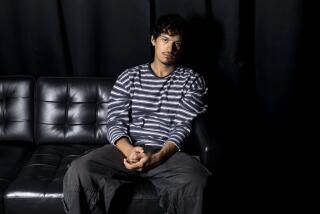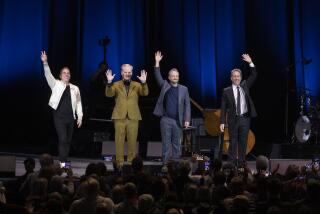Jeers or Cheers Await Amateurs at the Apollo
- Share via
NEW YORK — The first assault came less than a minute after Andrea Holdclaw opened her mouth. Boos rolled like sheets of thunder from the mezzanine, the balcony and the orchestra, rattling crystal chandeliers in the lobby.
The young singer from the District of Columbia never even flinched. She had waited too long for this moment, honing her showcase tune, “Somewhere Over the Rainbow,” to a tense, sweaty perfection.
Draped in an aqua-colored satin gown, she simply clenched her fists and cranked it up. That did it. Silenced by her overwhelming determination, the crowd of 1,500 at Harlem’s Apollo Theatre had switched to cheering by the time she hit the first refrain.
Other performers were not so lucky. On “Amateur Night at the Apollo,” the slightest mistake can seal your fate. New York’s historic midwife to musical fame, the Apollo’s warm spotlight has been fixed on joyful winners for more than five decades. Yet for every Ella Fitzgerald or Michael Jackson, whose victories on Amateur Night here launched them on careers of dazzling glory, dozens of acts drown in jeers.
Everything at the Apollo Theatre has always been Big Time. Opened in 1934 as an uptown alternative for black musicians at a time when they were barred from performing at most other venues, the Apollo has played host to nearly every major black vocalist since World War II. But its greatest success from the beginning has been with Amateur Night, that once-a-week marathon where anyone with steel nerves, a voice box or an act can come out and chase a dream.
Ralph Cooper, the salty master of ceremonies for Amateur Night, has been introducing the Wednesday night acts since the year the club opened. Some evenings, he seems more like a lion tamer than a cabaret host. But that is the essence of the Apollo crowd--one minute throwing roses at an old woman crooning “Inseparable” and the next hooting a weeping teen-age tap-dancer out of town.
The ornate theater, a centerpiece of commerce and art on Harlem’s busiest thoroughfare, 125th Street, has always attracted an odd crowd--part family, part show-biz, part tourist. In his early days as a Harlem drug dealer before he became a Muslim and one of the nation’s most arresting orators, Malcolm X could be found there most evenings selling marijuana to the country’s most famous jazz stars.
These nights, the crowd is still a mix of families with pigtailed girls in Mary Janes, local celebrities and record producers scouting for the next Stevie Wonder. Once broadcast nationwide on radio, the Apollo’s evening shows, including Amateur Night segments, now are syndicated weekly for television.
More to Read
The biggest entertainment stories
Get our big stories about Hollywood, film, television, music, arts, culture and more right in your inbox as soon as they publish.
You may occasionally receive promotional content from the Los Angeles Times.










